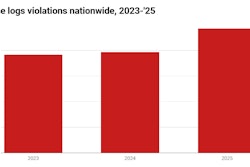Trucking news and briefs for Wednesday, Oct. 8, 2025:
- These six legislative reforms would improve truck driver safety, according to ATA.
- What is the "Driver Inc." scheme in Canada and how are trucking orgs to the north proposing to fight it?
- “What I did was what I would hope any other driver would do." -- Highway Angel and Boyle Transportation driver Amity Cataldo
ATA wants stronger CDL standards, calls on Congress for reform
The American Trucking Associations on Wednesday sent a letter to Congressional leaders urging them to enhance training, testing and licensing standards for CDL holders.
“Though commercial trucking is among the most heavily regulated industries in the United States, gaps in oversight, enforcement, and qualification requirements ... threaten safety on our nation’s highways,” wrote ATA President & CEO Chris Spear.
ATA’s letter highlighted issues around English language proficiency (ELP), cabotage, Entry-Level Driver Training (ELDT) and CDL issuance.
The organization noted that, while the U.S. DOT has recently taken steps forward in these areas, “targeted reforms are urgently needed to round out USDOT’s efforts and ensure all commercial drivers are properly qualified, adequately trained, and legally operating in the country.”
[Related: Truck drivers petition to require ELP endorsement for CDL holders]
ATA made six recommendations for action Congress should take:
- Codify President Donald Trump’s executive order on ELP for truck drivers, which some members of Congress have also proposed
- Direct the Federal Motor Carrier Safety Administration to initiate a rulemaking requiring an ELP test as part of the CDL issuance process
- Require individuals to hold a standard driver’s license for at least one year before becoming eligible for a CDL, with limited exceptions for certain workforce training programs
- Strengthen federal and state oversight of CDL issuance and testing to ensure only fully qualified drivers enter the industry
- Expedite the removal of non-compliant training providers from the FMCSA Training Provider Registry (TPR)
- Strengthen enforcement and penalties against cabotage, or illegal hauling by Mexican and Canadian carriers of loads point to point in the United States
ATA’s letter and full recommendations to congressional leaders can be read here.
Canadian Trucking Alliance launches new campaign against ‘Driver Inc.’ contractor scheme
The Canadian Trucking Alliance has launched a new campaign that aims “to end the illicit schemes destroying Canada's trucking industry, abusing workers and engaging in human trafficking, threatening the safety of the travelling public, and costing Canadians billions,” the group said.

The campaign, named Stop Illegal Trucking, calls out a “lack of enforcement” across all levels of government in Canada. CTA specifically named a scheme dubbed “Driver Inc.,” which the group said allows companies to misclassify employee drivers as independent contractors.
Under the Driver Inc. scheme, CTA said, drivers and carriers enter into agreements whereby drivers will incorporate themselves and will then “sell” their driving services to the carrier. Unlike traditional owner-operators, however, the drivers do not own, lease or operate a vehicle and instead drive the carrier’s truck. These drivers are then classified as contractors and companies avoid paying payroll taxes.
[Related: Are leased owner-operators truly independent contracts for labor-law purposes?]
CTA said the scheme has resulted in “exploited workers and unfair competition that is destroying honest trucking companies and lost public revenue that should be going to support Canadians in these tough economic times.”
"Essentially, we know that companies that routinely cut corners when it comes to tax and labor compliance, will most definitely do the same in all areas of their operation, including disregarding public safety by carelessly putting unfit equipment and untrained or poorly qualified drivers on the road," said Marco Beghetto, VP of Communications for CTA. "Canadians are now waking up to what we have been warning about for many years -- the industry is in crisis. This lawlessness is an extensional threat to our industry and puts Canadians at severe risk. It must end immediately."
The Alberta government recently announced it’s targeting the Driver Inc. scheme as part of a broader trucking safety crackdown.
CTA said many of the problems can be solved by enforcing laws and standards already on the books rather than by creating new laws or regulations.
"Responsible carriers and drivers pay their taxes, follow labor laws and prioritize safety -- and they are being punished by a system that tolerates cheating," said CTA chair Greg Arndt. "Canada can no longer afford to stand by and watch. The lawlessness we all see must end now."
The Stop Illegal Trucking campaign has evolved from its original Stop Tax and Labour Abuse name. CTA said its campaign’s evolution was “to better reflect the overall lawlessness throughout the industry and the full-scale threat to road safety, border security, and the public interest.”
[Related: CDL schools, fleets shut down in Canada in safety crackdown]
Trucker recognized for stopping to lend aid to fellow driver after crash
Amity Cataldo, a truck driver for Boyle Transportation, has been named a Highway Angel by the Truckload Carriers Association for her quick actions and compassion following a serious crash in Texas.
 Amity Cataldo
Amity Cataldo
“His tires went off the road; it was in a construction zone, it had been raining, there was mud from the construction on the road -- I feel so bad for this driver,” said Cataldo.
She then rushed to the injured driver’s side, finding him disoriented and bleeding.
“The driver was out of the truck, but he was really confused,” she said. “The poor kid, he was really cut up. He was bleeding on his arms and his knuckles.”
Cataldo stayed with him, offering reassurance and care until emergency crews arrived minutes later.
Her willingness to act swiftly and selflessly helped prevent further danger on the road and ensured the injured driver was not alone during those critical moments, TCA noted.
“What I did was what I would hope any other driver would do,” she said.









